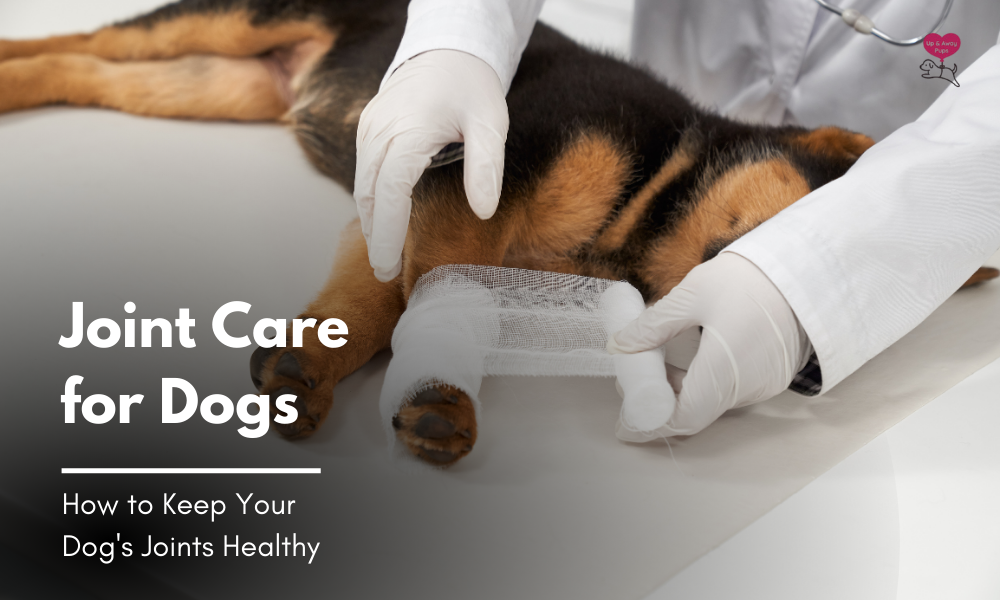Joint Care for Dogs: How to Keep Your Dog's Joints Healthy
Being a dog owner, it is important to understand that keeping your fur baby's joints healthier is important to make them remain active, without any pain, and playful. Dogs, like humans, depend on joint health for seamless movement and to enhance their life quality. However, numerous pet parents often need to pay more attention to the essence of proactive joint care till any issues pop up. The problems, including stiffness, arthritis, and challenges with mobility, notably influence the happiness and activity levels of your furry companion, mainly while they start aging.
Small dog breeds like the Teacup Havapoo or the Bichon Frise are specifically prone to joint issues due to their complicated compact build. These breeds need proper care to ensure that their joints stay in optimal conditions. Undertaking the proper preventative steps earlier on travels greater lengths to reduce any discomforts that enhance their longevity. In our post today, we will check out the numerous practical tips on joint care for dogs, generic joint health issues, and the extreme importance of knowing about the breed-specific requirements that can make your dog stay healthy and content.
Why Joint Health Matters for Dogs
Dog's joint health remains important for the effective upkeep of their mobility that minimizes any discomfort while enhancing the overall happiness of your dog. Lack of appropriate joint aid for dogs can lead to issues for hip dysplasia, arthritis, and injuries to ligaments from happening that affect the ability of your dog to jump, run or walk effortlessly. Small dog breeds, irrespective of their size, are not excluded from suffering from joint issues. With time, active small dog breeds like the Pomeranian or the Teacup Havanese often experience joint disorders. It is the reason why the pet owners should take proper care regarding that.
Common Joint Issues in Dogs
Joint issues are common in dogs. Identifying the early signs can help manage and treat joint issues more effectively.
Arthritis
Arthritis is a common joint issue often noticed in dogs, especially small breeds, as they start aging. It happens due to any sort of cartilage degeneration, eventually leading to stiffness and pain. Breeds like Bichon Frise often fail to reveal the symptoms until the conditions reach an advanced stage. It is important to take your pup for a vet inspection to treat this issue.
Luxating Patella
Often considered a kneecap dislocation, a luxating patella is a condition that often arises among small dog breeds like Teacup Havanese. Such conditions eventually lead to your dog's difficulty walking and limping, which needs prompt attention from your vet.
Hip Dysplasia
Although more common in large breeds, hip dysplasia can affect small breeds such as the Pomeranian, particularly if they are overweight or have a genetic predisposition.
Although hip dysplasia is a common issue among big dog breeds, it often impacts small breeds like the Pomeranian, specifically if they have a condition related to genetic predisposition or are overweight.
Essential Tips for Maintaining Joint Health
Offering proper attention to joint health for dogs lays a robust foundation for better comfort and mobility. Undertaking the proper steps for safeguarding and supporting their joints helps prevent a couple of general issues, boosting their quality of life. Dogs like the Havanese mainly benefit from such proactive measures.
Provide a Balanced Diet
As a dog parent, you can offer your pup a well-rounded diet to support its joint health. Appropriate nutrition helps to ensure that your dog is getting all the important nutrients, like phosphorus, calcium, and fatty acids, which help to strengthen the joints and bones. The inclusion of supplements or foods rich in chondroitin or glucosamine helps in safeguarding the joint cartilage while minimizing inflammation. Small dog breeds like the Bichon Frise are often prone to joint issues while streamlining their meals, including the joint-rich ingredients. Also, do not overfeed your pup while adding a couple of extra pounds, placing unwanted strain onto their compact frames.

A couple of brands of dog food add in the joint health formulas, making it seamless at offering your fur baby the appropriate nutrients. Also, start consulting with vets to find the ideal dietary options for the size, breed, and activity levels of the dog.
Keep Them Active
Following the appropriate exercise routine can help your dog's joints stay flexible while strengthening the muscles around them, which minimizes the chances of injuries. Small dog breeds often engage in moderate to consistent levels of exercise. Gentle play sessions, short walks, and the implementation of interactive toys help with movement instead of overloading the joints.
Swimming is another best option for dogs with existing joint problems or those who need less activity. The water supports the weight, enabling the dog to exercise instead of imposing stress on the joints. The activity is specifically effective for small dog breeds that are prone to issues with arthritis or luxating patella.
Provide Adequate Rest
Although offering your dog the proper amount of exercise is important, also give them appropriate resting times. Overexerting them can increase their joint issues in small dog breeds, who often fail to understand their limitations while at play. It is important to create a quiet, cozy space for proper rest to help their joints recover while minimizing the chances of injuries. The orthopedic beds are specifically made for the pups offering more support to their joint health. Such beds are specifically effective for older dogs or the ones who experience discomfort in joints.
Offer Joint Supplements
Including joint supplements in the diet plans of dogs offers more protection, mainly for breeds with joint health issues. Chondroitin and glucosamine are generally advised supplements to help support repairing the cartilage and minimizing inflammation. The breeds that are at a greater risk of arthritis help to benefit from the earlier doses of supplementation. The supplements rich in fish oil and fatty acids are yet other choices that help to maintain healthier joints while reducing stiffness. Ensure to consult with the vets prior to giving your dogs new supplements to ensure that your pups are safe and right for the needs of dogs.
Engage in Joint-Friendly Play
Playtime is the key to helping with the physical and mental well-being of a dog; however, a few specific activities often impose strain on their joints. Also, do not implement games that include more jumping, abrupt pauses, or twisting,g leading to eventual injuries in their joints. For small dog breeds, interactive games such as puzzle games or soft toys are perfect. Such activities offer better stimulation instead of placing stress on the joints. Following the routine with higher intensities enables your dog to have the best playtimes.
Grooming and Nail Care
Dogs with overgrown nails impact their posture, leading to greater stress on the joints. Following the appropriate nail trimming routine helps ensure that the dog's weight is evenly distributed to minimize the strain on the joint. Small dog breeds are considered for their thicker coats, as they need appropriate grooming to avoid matting that often limits their movement and causes greater discomfort.
Massage and Physical Therapy
Giving your dogs a massage or physical therapy can keep their joints flexible and increase their muscle strength. Gentle massages around the joints can help enhance circulation, helping to reduce inflammation and stiffness. Experts often guide physical therapy exercises to target the key areas boosting their joint health. Small dog breeds often respond well to such practices, especially when they start early. Proper massage routines can help identify any discomfort or strange swelling that would require prompt medical attention.
Monitor Weight Closely
Appropriate weight management is an intricate part of joint health. Excessive weight gain increases joint loads and damage. A couple of extra pounds has a notable impact on your dog. Feeding them the right-sized food and ensuring they remain active can help maintain their optimal weight. Using the puzzle bowl or a slow feeder often prevents your dog from overeating while encouraging them to eat more carefully.
Encourage Mobility Through Adjustments
Building a space supporting the dog's mobility can help reduce the stress on your dog's joints. Making smaller changes like adding steps or ramps for the furniture accesses can help prevent your dog from jumping unnecessarily, as small dog breeds are often prone to issues with their knees. Also, ensuring that the food and water bowls are reachable will help reduce them from awkwardly bending or stretching, making the regular routines easier for your furry companion.
Stay Hydrated
Hydration can help support the overall health of your dog, including joint lubrication. Also, ensure that your dog is accessing fresh and clean water to help maintain the functioning of their joints seamlessly. Small dog breeds, irrespective of their compact size, need proper hydration for the maintenance of their energy levels and the health of their joints. Also, encourage proper water intake with the help of the pet fountains or add a splash of low-sodium chicken broth to the water bowls while making drinking water more interesting.
Natural Remedies for Joint Care
Natural remedies often offer an effective and better way to support dogs' joint health without relying on medications. Such remedies increase discomfort while reducing inflammation and promoting long-term joint strength.
Anti-Inflammatory Foods
A few specific foods consist of natural anti-inflammatory properties to aid with reduced joint swelling and pain. The ingredients, such as turmeric, consist of curcumin that is often added to the meals of the dogs in smaller vet-approved portions. Blueberries are often rich in antioxidants, which is a delicious and healthier addition to the diet while fighting inflammation and supporting their overall joint health. Carrots, sweet potatoes and spinach are the ideal sources of beta carotene and other nutrients promoting the health of dog's joints. You can make them a bit steamed and serve them like treats mixed with regular meals for another level of boost.

Bone Broth
Bone broth is a nutrient-rich natural remedy that helps in the effective support of a dog's joint health, offering glucosamine, collagen, and chondroitin. Such elements are the key to repairing the cartilage and maintaining the flexibility of their joint. Giving your dogs warm bone broth is extremely effective for small dog breeds or older dogs who are often prone to significant joint issues. Also, be sure to use homemade bone broth or bought from a reliable pet-safe source that is free from any added salt, onions, or any other harmful ingredients.
Herbal Supplements
Herbs like licorice root, ginger, or alfalfa are considered effective joint-supporting and anti-inflammatory properties. Alfalfa, specifically, is rich in minerals and vitamins, strengthening the joints while reducing stiffness. When offered in smaller amounts, it can enhance circulation and ease the discomfort in dogs suffering from joint pain or arthritis. Ensure to consult with your vet prior to using herbs.
Coconut Oil
Coconut oil offers several health-related perks, including enhanced joint health. Its anti-inflammatory properties effectively minimize swelling, although the healthier fats promote lubrication in the joints. Small dog breeds who suffer from stiff joints often benefit from coconut oil when added to meals or topically applied during massages.
CBD Oil
CBD oil is naturally derived from hemp and has attained a lot of fame as the natural remedy for inflammation and joint pain in dogs. It impacts the endocannabinoid system of the body to aid in minimizing discomfort while enhancing mobility. The remedy is specifically beneficial for aging dog breeds or the ones with chronic arthritis. While opting for a CBD product, always pick the one that is tailored for the pet while consulting with the vets for the right dosage.
Conclusion
Having a proactive approach is a must-have to keep the joints of your dogs healthier. Using a blend of the right nutrition, proper exercises, and preventive care leaves a notable mark on the quality of your dog's life. Small dog breeds need the right amount of care that can help make their joints healthier and stronger. Following the appropriate practices can help your furry companion continue leading a joyful and active life that is free from any type of restrictions toward joint pain.


